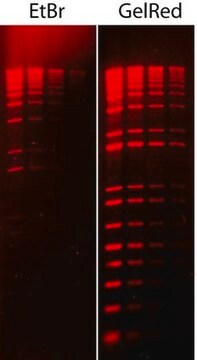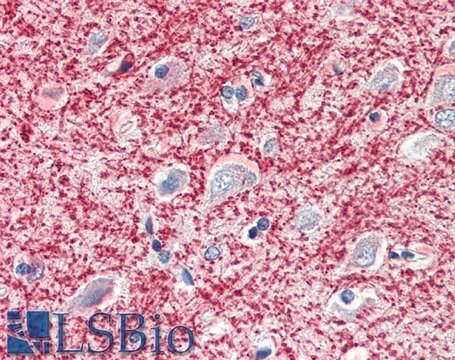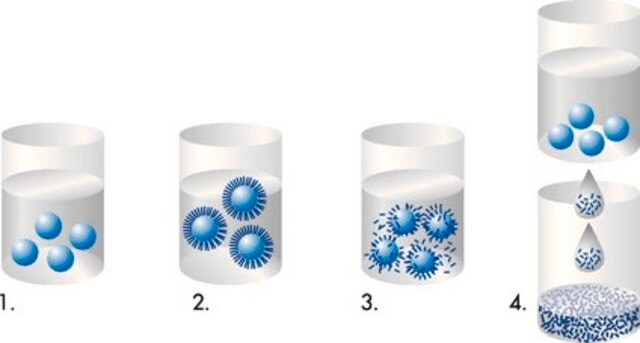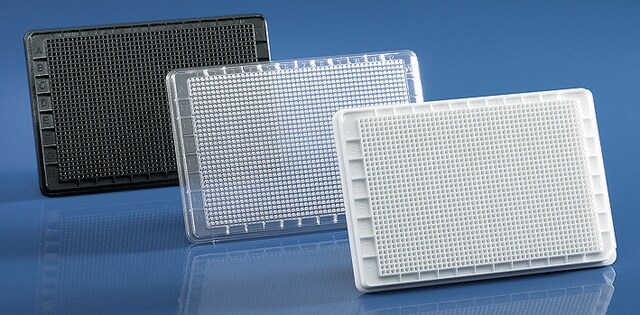HTS201RTA
Ready-to-Assay GPR109A Nicotinic Acid Receptor Frozen Cells
Faça loginpara ver os preços organizacionais e de contrato
About This Item
Código UNSPSC:
41106514
eCl@ss:
32011203
Produtos recomendados
fonte biológica
human
Nível de qualidade
fabricante/nome comercial
Ready-to-Assay
técnica(s)
calcium flux assay: suitable
nº de adesão NCBI
método de detecção
fluorometric
Descrição geral
Millipore′s Ready-to-Assay GPCR frozen cells are designed for simple, rapid calcium assays with no requirement for intensive cell culturing. Millipore has optimized the freezing conditions to provide cells with high viability and functionality post-thaw. The user simply thaws the cells and resuspends them in media, dispenses cell suspension into assay plates and, following over night recovery, assays for calcium response.
Nicotinic acid (niacin), a vitamin of the B complex, is used clinically in high doses to decrease total plasma levels of cholesterol. Interestingly, the total cholesterol levels and low-density lipoprotein (LDL) concentrations decrease, while the high-density lipoprotein (HDL) concentrations increase with nicotinic acid treatment. The cholesterol-lowering effects of nicotinic acid result from inhibition of lipolysis in adipose tissue, which decreases plasma levels of free fatty acid (FFA) (Altschul et al., 1955; Carlson, 1963). In a study of nicotinic acid and myocardial infarction in the Coronary Drug Project (1966-1975), patients receiving 3 g/day nicotinic acid exhibited reduced rates of myocardial infarction (Coronary Drug Project Research Group, 1975). However, an unwanted effect of high doses of nicotinic acid is vasodilatation, occurring mainly in the upper body and face, known as flushing. Recently two receptors for nicotinic acid have been identified as class A G protein-coupled receptors that couple to Gi to inhibit accumulation of cAMP (Offermans, 2006). GPR109A (also known as HM74A in humans and PUMA-G in mice) is a high affinity receptor for nicotinic acid, whereas GPR109B (also known as HM74) is a low affinity receptor for nicotinic acid that is found in humans but not rodents (Wise et al., 2003). GPCR109A is found primarily in adipose tissue and immune cells. Millipore′s cloned human GPR109A-expressing cell line is made in the Chem-4 host, which supports high levels of recombinant GPR109A expression on the cell surface and contains optimized levels of a recombinant promiscuous G protein to couple the receptor to the calcium signaling pathway. Thus, the cell line is an ideal tool for screening for agonists, antagonists, and modulators at GPR109A.
Nicotinic acid (niacin), a vitamin of the B complex, is used clinically in high doses to decrease total plasma levels of cholesterol. Interestingly, the total cholesterol levels and low-density lipoprotein (LDL) concentrations decrease, while the high-density lipoprotein (HDL) concentrations increase with nicotinic acid treatment. The cholesterol-lowering effects of nicotinic acid result from inhibition of lipolysis in adipose tissue, which decreases plasma levels of free fatty acid (FFA) (Altschul et al., 1955; Carlson, 1963). In a study of nicotinic acid and myocardial infarction in the Coronary Drug Project (1966-1975), patients receiving 3 g/day nicotinic acid exhibited reduced rates of myocardial infarction (Coronary Drug Project Research Group, 1975). However, an unwanted effect of high doses of nicotinic acid is vasodilatation, occurring mainly in the upper body and face, known as flushing. Recently two receptors for nicotinic acid have been identified as class A G protein-coupled receptors that couple to Gi to inhibit accumulation of cAMP (Offermans, 2006). GPR109A (also known as HM74A in humans and PUMA-G in mice) is a high affinity receptor for nicotinic acid, whereas GPR109B (also known as HM74) is a low affinity receptor for nicotinic acid that is found in humans but not rodents (Wise et al., 2003). GPCR109A is found primarily in adipose tissue and immune cells. Millipore′s cloned human GPR109A-expressing cell line is made in the Chem-4 host, which supports high levels of recombinant GPR109A expression on the cell surface and contains optimized levels of a recombinant promiscuous G protein to couple the receptor to the calcium signaling pathway. Thus, the cell line is an ideal tool for screening for agonists, antagonists, and modulators at GPR109A.
Descrição de linhagem celular
- GPCR Cell Lines
- Host cells: Chem-4
Aplicação
Human GPR109A GPCR frozen cells for Calcium Flux FLIPR Assays.
Ações bioquímicas/fisiológicas
- GPCR Class:A
- Protein Target: GPR109A
- Target Sub-Family: Nicotinic Acid
Componentes
Pack contains 2 vials of mycoplasma-free cells, 1 ml per vial.
Fifty (50) mL of Media Component.
Fifty (50) mL of Media Component.
Exoneração de responsabilidade
This product contains genetically modified organisms (GMO).
Within the EU GMOs are regulated by Directives 2001/18/EC and 2009/41/EC of the European Parliament and of the Council and their national implementation in the member States respectively.
Código de classe de armazenamento
10 - Combustible liquids
Classe de risco de água (WGK)
WGK 3
Ponto de fulgor (°F)
Not applicable
Ponto de fulgor (°C)
Not applicable
Certificados de análise (COA)
Busque Certificados de análise (COA) digitando o Número do Lote do produto. Os números de lote e remessa podem ser encontrados no rótulo de um produto após a palavra “Lot” ou “Batch”.
Já possui este produto?
Encontre a documentação dos produtos que você adquiriu recentemente na biblioteca de documentos.
Nossa equipe de cientistas tem experiência em todas as áreas de pesquisa, incluindo Life Sciences, ciência de materiais, síntese química, cromatografia, química analítica e muitas outras.
Entre em contato com a assistência técnica




